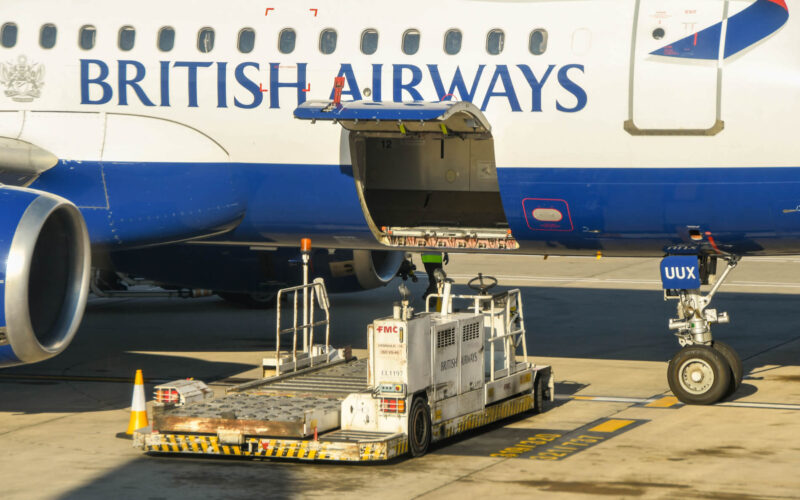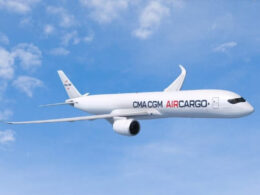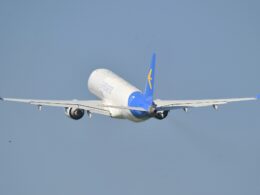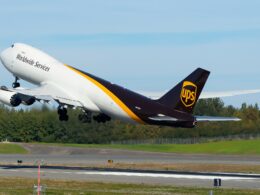Cargo, perhaps like no other branch of the aviation industry, has had quite a shaky past few years. Distraught by trade tensions, air freight saw its fortunes turn around in 2020 and the industry was able to deliver a record-breaking year.
What was it like for International Airlines Group (IAG) (IAG) Cargo? “Success,” Naomi Robinson, the Head of Business Management at IAG Cargo, in an exclusive interview with AeroTime News, described 2020 for the air freight company. “I think we have delivered absolutely everything for our customers across 2020 so I think the word success and delivery would be the words that come to mind.” The company managed to finish the year with yields up a whopping 94.6%, despite the fact that IAG Cargo sold 34.9% fewer tonnes through 2020.
Responding to the pandemic
While in Europe the pandemic seemingly had a very sudden impact, signs that something was going wrong were evident early in the year. Maybe underestimating the potential effect that COVID-19 could have on the flow of aircraft between various landmasses across the world, the industry was ill-prepared at first. However, it also quickly bounced back and attempted to get back on its feet.
“We were starting to see the impact of that right at the start. Going into Q1 and March 2020 onwards is where we saw the pandemic grow across the globe and the impact it had on the aviation industry,” said Robinson. The key to responding at that time was “being able to respond really quickly, being agile, and being flexible,” she noted. While the passenger side of the industry grappled with repatriating passengers and adjusting the scales of operations for the next few months, cargo operations had little time to breathe. Personal Protection Equipment (PPE) had to be shipped between manufacturing sites and hospitals, as the fight against the pandemic had begun.
“The demand for PPE spiked around the spring and that continued throughout the year. That has predominantly been out of the Asia-Pacific region, as you probably expect a lot of manufacturing there and was transported across both cargo-only operations and on charters,” commented the IAG Cargo executive. The company unveiled its first phreighter, a passenger aircraft stripped off its seats, in May 2020 when a British Airways Boeing 777 was transformed. Prior to that, IAG had performed many cargo-only flights with passenger aircraft.
“IAG Cargo had over 5,000 cargo-only and charter flights that we operated across 2020, which was a significant number. We deployed [aircraft – ed. note] where our customers needed them the most to ensure that the freight continued to move from A to B,” commented Robinson. While air freight capacity plummeted due to lack of passenger flights, which resulted in a drop in belly cargo capacity, “we have been able to deploy the cargo-only and the charters to ensure that they are deployed to where our customers need them,” she continued, ensuring the stability of capacity throughout the year, despite fluctuations in passenger aircraft activity.
“There have been new routes started because of customer demand,” commented Robinson, pointing out Lahore, Pakistan, as one of the examples of new destinations served by IAG Cargo. The route, which the company began flying to in October 2020, was specifically catered to respond to the mango season, as well as leather and textile manufacturing based in the Pakistani city. “Across the year we were able to offer a stable and wide-reaching network because of those charters and cargo-only offerings,” concluded Robinson.
With the introduction of vaccines to the equation, the difficulty of cargo operations was seemingly set to only increase. However, Robinson noted that the fact that IAG Cargo already had three hubs, namely London Heathrow Airport (LHR), Dublin Airport (DUB), and Madrid International Airport (MAD), where temperature-sensitive product storage and transportation solutions were available, meant that the company was “able to service and deliver relatively easily and quickly for our customers.”
She added that IAG Cargo was not only involved in transporting vaccines to countries where the group’s airlines are based, but also to such destinations as Balearic and Canary Islands, two autonomous island archipelagos, the Dominican Republic, and El Salvador, to name a few examples.
Bright future or bleak outlook for cargo operations?
While the lack of supply and overflowing demand resulted in record-breaking yields for the air cargo industry, the ‘glass half-empty’ questions were raised whether a 2019 scenario of record-low yields and demand would return sooner rather than later. However, could it be that due to a by-product of current events, the demand for air freight would not experience another slump as it did two years ago?
“One area we have definitely seen growth has been e-commerce, as we have all been locked at home, stuck at home in lockdown and working from home and so consumer spending online has grown throughout the year. We are anticipating to see that growth this year too,” indicated Robinson. An uptick in demand to carry automotive parts, from tires to car doors, is another trend that Robinson envisioned will only grow, especially as lockdowns end across the globe.
In the short-term future, the executive expects that the industry will still be at the forefront of aviation throughout 2021. The fact that, unlike passenger aircraft-based services, the ability to deploy cargo flights on a whim will cater to the demand to transfer various commodities, whether that would be PPE or general goods. “If there are new routes where there is demand, we will absolutely look to support the demand,” noted Robinson. “I do anticipate we will still be deploying cargo-only and phreighter operations throughout this year.”
After all, continuing to deliver the COVID-19 vaccine to various regions across the world is still an issue that has to be addressed. IAG Cargo joined UNICEF Humanitarian Airfreight Initiative to support the COVAX initiative to deliver vaccines to impoverished regions across the world, meaning apart from the company’s usual temperature-sensitive operations, the vaccine-transportation effort will still play a part at IAG Cargo.
Nevertheless, the recovery of the aviation industry, in general, is predicted to be rocky. Leisure travel, including Visiting Friends/Relatives (VFR), is thought to recover first, as businesses are looking to limit their expenses like corporate travel. Considering the large part that belly-hold cargo capacity plays in the general air freight industry, could that still result in a shortage of capacity to carry cargo?
From the perspective of IAG Cargo, the fact that the group encompasses a fair share of differentiated airlines, whether that would be British Airways or Iberia that operate fairly different networks, perhaps allow the company to mitigate the risk. “We can continue to operate using belly hold capacity when passenger flights grow, or we have the option to continue with the cargo only and a hybrid between the two,” noted Robinson, adding that the flexibility and size of IAG airlines’ fleet allowed the cargo company to “offer those different and bespoke solutions depending on the customer.”
Still, there are things to consider when looking at the future of the cargo industry. “The air cargo industry tends to be quite cyclical – it tends to have peaks and troughs. So, it is just a question of how long the peaks and troughs will last in this new world,” the executive at IAG Cargo stated. While the company has no dedicated freighters, perhaps that is their biggest advantage – it is less exposed to the cyclical nature of the air freight industry and can remain as flexible as is possible, concluded Robinson.











